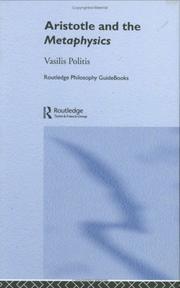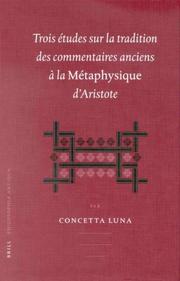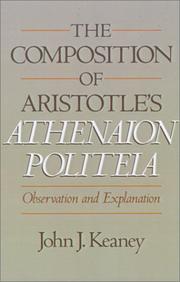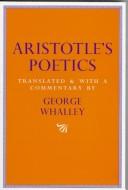| Listing 1 - 10 of 259 | << page >> |
Sort by
|
Book
ISBN: 9004262350 9789004262355 9789004131651 9004131655 9789004260344 900426034X Year: 2015 Publisher: Leiden
Abstract | Keywords | Export | Availability | Bookmark
 Loading...
Loading...Choose an application
- Reference Manager
- EndNote
- RefWorks (Direct export to RefWorks)
John Buridan (d. circa 1360) was one of the most talented and influential philosophers of the later Middle Ages. He spent his career as a master in the Arts Faculty at the University of Paris, producing commentaries and independent treatises on logic, metaphysics, natural philosophy, and ethics. His Questions Commentary on the eight books of Aristotle's Physics is the most important witness to Buridan's teachings in the field of natural philosophy. The commentary was widely read during the later Middle Ages and the Renaissance. This volume presents the first critical edition of books I andamp; II of the final redaction of Buridan's Questions Commentary on the Physics . The critical edition of the Latin text is accompanied by a detailed guide to the contents of Buridan's questions.
Book
ISBN: 900426129X 9789004261297 1306189055 9781306189057 9789004261280 9004261281 Year: 2013 Publisher: Boston
Abstract | Keywords | Export | Availability | Bookmark
 Loading...
Loading...Choose an application
- Reference Manager
- EndNote
- RefWorks (Direct export to RefWorks)
Few philosophical books have been so influential in the development of Western thought as Aristotle’s Metaphysics . For centuries Aristotle’s most celebrated work has been regarded as a source of inspiration as well as the starting point for every investigation into the structure of reality. Not surprisingly, the topics discussed in the book – the scientific status of ontology and metaphysics, the foundations of logical truths, the notions of essence and existence, the nature of material objects and their properties, the status of mathematical entities, just to mention some – are still at the centre of the current philosophical debate and are likely to excite philosophical minds for many years to come. This volume reconstructs in fourteen chapters a particular phase in the long history of the Metaphysics by focusing on the medieval reception of Aristotle’s masterpiece, specifically from its introduction in the Latin West in the twelfth through fifteenth centuries. Contributors include: Marta Borgo, Matteo di Giovanni, Amos Bertolacci, Silvia Donati, Gabriele Galluzzo, Alessandro D. Conti, Sten Ebbesen, Fabrizio Amerini, Giorgio Pini, Roberto Lambertini, William O. Duba, Femke J. Kok, and Paul J.J.M. Bakker.
Philosophy, Medieval. --- Medieval philosophy --- Scholasticism --- Aristotle. --- Aristoteles.
Book
Year: 2022 Publisher: [s.l.] : Logos Verlag Berlin,
Abstract | Keywords | Export | Availability | Bookmark
 Loading...
Loading...Choose an application
- Reference Manager
- EndNote
- RefWorks (Direct export to RefWorks)
Dieses Buch problematisiert "die Sophistik" als Gegenstand der Philosophiegeschichte und stellt die These auf, "die Sophistik" sei das Resultat einer philosophischen Operation. Anhand der kritischen Diskussion relevanter Texte von Platon und Aristoteles wird versucht, eine eigentümliche sophistische λόγος-Form zu rekonstruieren. Der Konflikt zwischen Sophistik und Philosophie wird als ein Konflikt zwischen einer parametrischen und einer strategischen Rationalitätsform dargestellt. Fernando Oreja (Madrid, 1966) lebt in Berlin, ist promovierter Philosoph und Philosophiehistoriker mit Schwerpunkt Antike und arbeitet haupt- und freiberuflich als technischer Übersetzer für die Sprachen Deutsch und Spanisch.
Sophistik --- Platon --- Aristoteles --- Protagoras --- Philosophie der Antike

ISBN: 0415251478 0415251486 1134529791 1280095318 0203647424 1134529805 9781134529797 9780203647424 9781134529759 9781134529803 9780415251471 9780415251488 Year: 2004 Publisher: London Routledge
Abstract | Keywords | Export | Availability | Bookmark
 Loading...
Loading...Choose an application
- Reference Manager
- EndNote
- RefWorks (Direct export to RefWorks)
Metaphysics. --- Aristotle. --- Metaphysics --- 1 <38> ARISTOTELES --- 1 <38> ARISTOTELES Griekse filosofie--ARISTOTELES --- Griekse filosofie--ARISTOTELES --- God --- Ontology --- Philosophy --- Philosophy of mind --- Aristoteles. --- Aristotle --- Philosophy, Ancient --- Métaphysique --- Philosophie ancienne --- Aristotle. - Metaphysics.

ISSN: 00791687 ISBN: 9004120742 9004321136 9789004120747 Year: 2001 Volume: 88 Publisher: Leiden ; Boston : Brill,
Abstract | Keywords | Export | Availability | Bookmark
 Loading...
Loading...Choose an application
- Reference Manager
- EndNote
- RefWorks (Direct export to RefWorks)
This volume discusses the relationship between the four extant ancient commentaries on Aristotle's Metaphysics of Alexander of Aphrodisias, Syrianus, Asclepius and Ps. Alexander. Comparative analysis of these commentaries allows Luna to attribute the Ps. Alexander to Michael of Ephesis and to show to what extend Syrianus made use of Alexander and Asclepius of both of them. The author draws up a precise genealogy of these Metaphysics commentaries. The book is indispensable for anyone working on the history of Aristotelian exegesis.
Aristotle. --- Aristotle --- Aristoteles. --- Aristoteles --- Aristote --- Aristotile --- Metaphysics (Aristotle) --- Aristotle's Metaphysics (Aristotle) --- Metaphysica (Aristoteles) --- Metaphysica (Aristotle) --- Metaphysik (Aristotle) --- Métaphysique (Aristotle) --- Meta ta physika (Aristotle) --- Aristotle - Metaphysics

ISBN: 1280525843 0195361407 142940728X 9781429407281 9781280525841 0195070321 9780195070323 019770445X Year: 1992 Publisher: New York : Oxford University Press,
Abstract | Keywords | Export | Availability | Bookmark
 Loading...
Loading...Choose an application
- Reference Manager
- EndNote
- RefWorks (Direct export to RefWorks)
A critical analysis of Aristotle's historical document on Athenian democracy, which starts from the belief that the ""Athenaion Politeia"" does not fit any ancient genre. The author argues that Aristotle created a new genre and was not therefore inhibited by generic constraints of any kind.
Political geography. --- Geography, Political --- Human geography --- Aristotle. --- Aristoteles.

ISBN: 128285450X 9786612854507 0773566600 9780773566606 0773516123 9780773516120 0773516115 9780773516113 9781282854505 6612854502 Year: 1997 Publisher: Montreal [Que.] McGill-Queen's University Press
Abstract | Keywords | Export | Availability | Bookmark
 Loading...
Loading...Choose an application
- Reference Manager
- EndNote
- RefWorks (Direct export to RefWorks)
Aristotle's Poetics combines a complete translation of the Poetics with a running commentary, printed on facing pages, that keeps the reader in continuous contact with the linguistic and critical subtleties of the original while highlighting crucial issues for students of literature and literary theory. Whalley's unconventional interpretation emphasizes Aristotle's treatment of art as dynamic process rather than finished product. The volume includes two essays by Whalley in which he outlines his method and purpose. He identifies a deep congruence between Aristotle's understanding of mimesis and Samuel Taylor Coleridge's view of imagination. Whalley's new translation makes a major contribution to the study of not only the Poetics and tragedy but all literature and aesthetics.
Poetry --- Aesthetics --- Aristotle. --- Aristoteles. --- Ἀριστοτέλης. --- Radio broadcasting Aesthetics
Book
ISBN: 900432514X 9789004325142 9789004324954 900432495X Year: 2016 Publisher: Leiden Boston Brill
Abstract | Keywords | Export | Availability | Bookmark
 Loading...
Loading...Choose an application
- Reference Manager
- EndNote
- RefWorks (Direct export to RefWorks)
The physician and commentator Sergius of Reshaina (d. 536) composed two related texts in Syriac about the philosophy of Aristotle, chiefly dealing with themes discussed by Aristotle in his Categories , but also with his teaching on space as found in the Physics . This book presents a critical edition and English translation of the shorter of these texts. A survey of Sergius’ life and works is given in the introduction and the intellectual context of his education in Alexandria is outlined, with focus on the medical and philosophical curricula of the Alexandrian school. Sergius’ line of thought is clarified and his text is compared to Greek commentaries on the Categories that also present the teaching of his Neoplatonist master Ammonius Hermeiou.
Aristotle. --- Sergius, --- Rescainae, Sergius, --- Serge, --- Sergios, --- Sergio, --- Aristoteles.
Book
Year: 2012 Publisher: Ljubljana ZRC SAZU, Založba ZRC
Abstract | Keywords | Export | Availability | Bookmark
 Loading...
Loading...Choose an application
- Reference Manager
- EndNote
- RefWorks (Direct export to RefWorks)
Aristotelova Druga analitika, eno izmed del, ki tvorijo sklop njegovih logiških spisov, imenovan Organon, velja v dolgi tradiciji evropske misli za prvo fokusirano razmišljanje s področja teorije in filozofije znanosti. Če je Prva analitika postregla z analizo silogizma kot obliko logičnega sklepanja, se je v njenem »nadaljevanju« Aristotel soočil z vprašanjem, kako slednje uporabiti v znanosti (epistēmē) in ga povezal s tem, kdaj kaj vemo in kakšni so pogoji za njen obstoj. Pri tem izhaja iz stališča, da kaj vemo takrat, ko vemo, zakaj je tisto, kar vemo, nujno takšno~razlago razume kot dokaz o tem. Ta ima zato strukturo sklepanja, osrednja vprašanja v Drugi analitiki pa so zato povezana z opredelitvami znanosti oz. znanstvenega razumevanja, dokaza, definicije in npr. vzročnosti. Delo, napisano z nezgrešljivo natančnostjo in »analitičnostjo« antičnega filozofskega velemojstra, v slovenski prostor vnaša potrebno svežino dragocene zgodovinske perspektive za vse, ki se ukvarjajo s področji epistemologije, logike ali npr. znanstvene metodologije.
ancient philosophy --- Aristotle --- Greek philosophy --- antična filozofija --- Aristoteles --- grška filozofija
Book
ISBN: 9783110220018 3110220016 1282716336 9786612716331 3110220024 9783110220025 Year: 2010 Volume: 5 Publisher: Berlin Boston
Abstract | Keywords | Export | Availability | Bookmark
 Loading...
Loading...Choose an application
- Reference Manager
- EndNote
- RefWorks (Direct export to RefWorks)
This book contains the first English translation of Abūl-Walīd Ibn Rushd's (Averroes') so-called Epitome of Aristotle's Metaphysics . The original Arabic text was composed around 1160 as a sort of appendix to a series of compendia of Aristotle's works on natural philosophy by the famous Andalusian philosopher. The two most interesting things about this work are the fact that Averroes restructures here the Aristotelian text according to his own conception of metaphysics, as opposed to his great literal commentary which follows the order of the Metaphysics section by section, and that he constantly revised this work over more than three decades. The present translation is based on a wide range of documents including, apart from the available Arabic editions, a number of medieval Arabic manuscripts not taken into consideration in these editions as well as the Renaissance translation into Latin prepared by Jacob Mantinus. It is accompanied by a commentary dealing with the major philosophical topics, Averroes' sources and problems of the transmission and constitution of the text. In addition, the most important variant readings of the manuscripts are noted in footnotes underneath the translation.
Metaphysics. --- Islamic philosophy --- Métaphysique --- Philosophie islamique --- Aristotle. --- Averroës, --- Aristotle. -- Metaphysics. --- God --- Ontology --- Philosophy --- Philosophy of mind --- Aristoteles. --- Averroes. --- Islamic Philosophy. --- PHILOSOPHY --- Metaphysics (Aristotle). --- 08.22 medieval philosophy. --- Rezeption. --- Islamische Philosophie. --- Arabisch. --- Metaphysica (Aristoteles). --- Aristoteles --- Aristoteles; Ta meta ta physika. --- Averroes; Talḫīṣ mā baʻda al-ṭabīʻa. --- Aristoteles, --- Metaphysica
| Listing 1 - 10 of 259 | << page >> |
Sort by
|

 Search
Search Feedback
Feedback About UniCat
About UniCat  Help
Help News
News